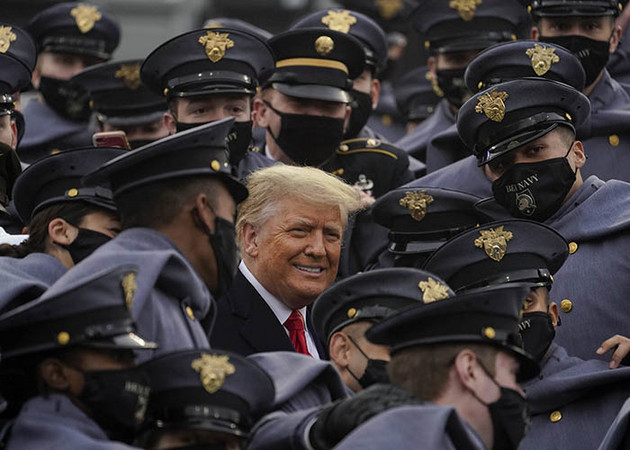Former President Donald Trump announced on Monday that he had ordered the immediate dismissal of the boards of visitors for all U.S. military service academies. These advisory panels, responsible for overseeing academic programs and student life, have come under scrutiny as Trump pushes back against what he describes as “woke” ideology infiltrating the nation’s military training institutions.
Trump’s Statement and Justification
Trump made the announcement via Truth Social, stating, “Our Service Academies have been infiltrated by Woke Leftist Ideologues over the last four years. I have ordered the immediate dismissal of the Board of Visitors for the Army, Air Force, Navy, and Coast Guard.”
The former president did not immediately name replacements for the dismissed board members, leaving a temporary leadership gap in these advisory roles. His decision aligns with his broader efforts to eliminate diversity and inclusion initiatives within the U.S. military, a central theme of his second-term agenda.
Republican Concerns Over ‘Woke’ Influence
Trump and his Republican allies have long criticized what they perceive as an increasing influence of progressive ideology within the military. Many have pointed to diversity and inclusion efforts as detrimental to military readiness and cohesion. The service academies, responsible for training future officers, have been a focal point of these concerns.
Recent reports suggest that the Department of Defense has restricted access to certain books in its educational institutions, while service academies have already begun dissolving student clubs centered around diversity. At West Point, for example, a dozen such organizations—including the Asian-Pacific Forum Club and the National Society of Black Engineers Club—were reportedly disbanded in response to Trump’s executive orders.
Structural Changes and Political Context
The boards of visitors for military academies typically include both presidential appointees and congressional members. This balance allows for oversight from multiple political perspectives.
Trump’s move echoes actions taken by the Biden administration in 2021, when top former Trump officials were removed from service academy boards. At the time, the Biden administration cited concerns over politicization of the boards and sought to install new members more aligned with its policies.
Impact and Future Implications
The dismissal of these advisory panels raises questions about the future governance of military academies and the extent to which political influence shapes military education. Without immediate replacements, there may be a period of uncertainty regarding oversight and policy implementation at these institutions.
While Trump’s actions have been praised by those who support his stance against diversity initiatives, critics argue that removing oversight bodies could harm institutional stability and weaken nonpartisan governance within military academies.
FAQs
1. What are the boards of visitors for military academies?
The boards of visitors are advisory panels responsible for overseeing academic programs, student life, and institutional policies at U.S. military service academies, including West Point, the U.S. Naval Academy, the U.S. Air Force Academy, and the U.S. Coast Guard Academy.
2. Why did Trump dismiss the military academy boards?
Trump claims that these institutions have been infiltrated by “woke” ideology and that their governance needs to be restructured to eliminate progressive influences.
3. Has this happened before?
Yes, the Biden administration removed Trump-appointed officials from these boards in 2021, arguing that they were too politically aligned with the previous administration.
4. What happens next?
As of now, Trump has not named new board members. This leaves a temporary gap in oversight, though new appointments are expected to follow.
5. How does this impact military academies?
The immediate impact may be minimal, but over time, changes in leadership could influence policy decisions, curriculum, and overall governance.
Conclusion
Trump’s decision to remove the boards of visitors from U.S. military academies marks another step in his efforts to reshape military policy and eliminate what he sees as progressive influences. While supporters view this as a necessary correction, critics warn that it may lead to increased political interference in military education. The full impact of these changes will depend on who is appointed to replace the dismissed board members and how the service academies adapt to the new direction.
As the situation unfolds, it remains to be seen whether this move will strengthen or weaken the effectiveness of military academy oversight in the long run.

